Theme Parks & Themed Entertainment
I am Number Three: Competing in the Ultimate Disney Trivia Tournament
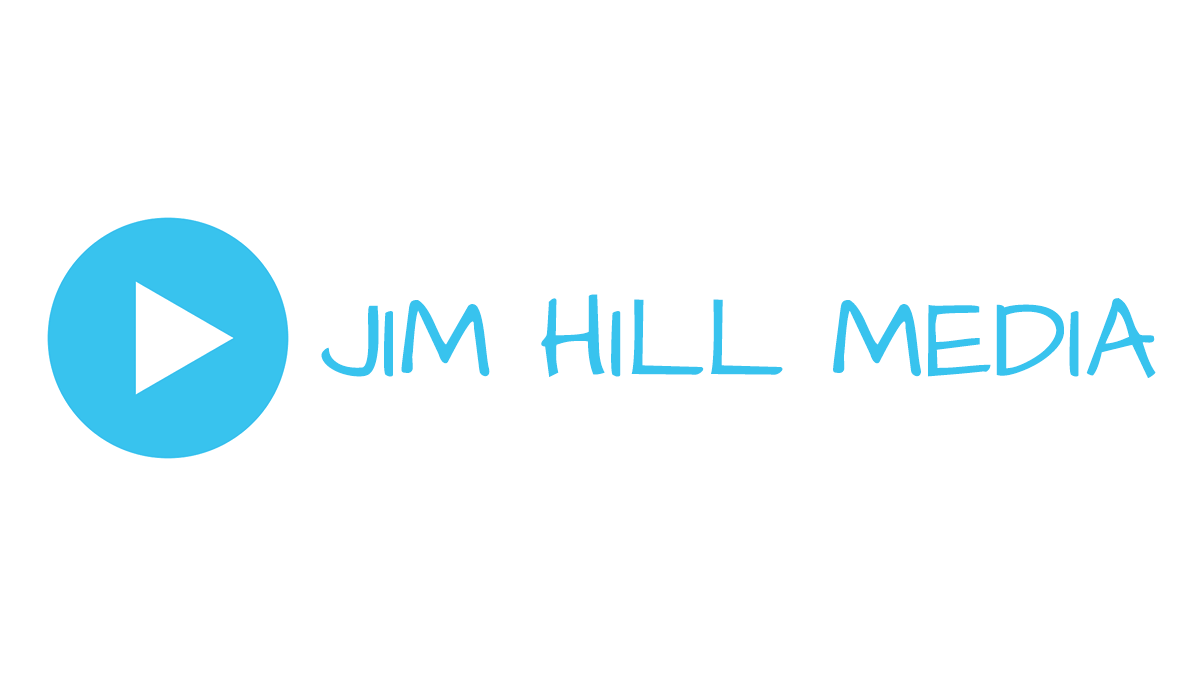
I really should have studied.
That was the main thought going through my mind as I walked
toward the Anaheim Convention Center on Thursday, August 18th. I had meant to
prepare for the Ultimate Disney Trivia Tournament by reading my copy of "Disney A to Z" and any Disney trivia books I could get my hands on, but I never found
the time. And by this point, it was too late to do anything about it. I was
going to have to hope that whatever amount of Disney knowledge that was
floating around in my brain was going to be enough to get me far enough in the
tournament that I wouldn't embarrass myself.
Please understand that I had shown up for the Ultimate
Disney Trivia Tournament with no expectation that I'd be in the running for the
grand prize, a 3-day cruise on the Disney Fantasy. I had decided to participate
just to get an idea of how much I knew about Disney, and because the whole idea
of competing against some of the most knowledgeable Disney fans as well as the
quiz masters from D23 & the Walt Disney Archives sounded as intriguing to
me as it sounded terrifying. I made up
my mind from the beginning that I'd be happy with my final standing in the
tournament no matter how far I got – as long as I didn't get eliminated right
from the start.

Dan Roebuck of "LOST" fame served as MC of the 2011 Ultimate Disney Trivia
tournament. Copyright Disney Enterprises, Inc. All rights reserved
That Thursday morning, there were a couple hundred people
standing in line outside the Anaheim Convention Center waiting to test their
mettle. The group was very diverse as
far as ages and background. There were teenage girls and older men, folks from
southern California and folks from the East Coast and Japan, and people that I
knew pretty well from the Disney fan community as well as people who I'd never
met before.
Some people were quizzing each other in the queue in the
hope of improving their chances. While others just stood quietly, confident
that they were ready for whatever Disney could throw at them. I spotted several people in line that I knew
would go pretty far in the tournament. After hearing a few trivia questions, I
was even surer that I really should have studied more. Well, as the Ghost Host
might say, there's no turning back now.
The first round of the Ultimate Disney Trivia Tournament was
the one that had me the most worried. What the folks from D23 did for the first
round was to have a couple of people at a time walk through the doors of the
Convention Center, where a D23 staff member would then meet each
contestant. Each contestant would be
asked one question. If the contestant got the question, they'd then get a
sticker with Ludwig Von Drake on it, and they'd proceed up the escalator to the
third floor of the Convention Center and Round Two of the tournament. If the
person blew the question, they'd get a sticker with Bertie Birdbrain from Toot,
Whistle, Plunk, and Boom on it and they were done, although the person could
get back in line and try again. The line was supposed to be cut off by 9:30
a.m., or as soon as Disney had 2,000 people who made it through the first
round. Fortunately for anyone who did mess up on their question, it didn't look
like there would be enough contestants for the 2,000-person-limit to be a
problem.

Copyright Disney Enterprises, Inc. All rights reserved
I walked up to the D23 staff member, as nervous as all
get-out and hoping that I wouldn't be taking the "Disney Trivia Walk of Shame".
Then came the question: What were the names of Donald's nephews? I breathed a sigh
of relief that I had gotten such an easy question, answered "Huey, Dewey, and
Louie", and then got my Ludwig von Drake sticker.
Although I'd read the rules of the Tournament before
deciding to participate, I really didn't know what to expect as I stepped off
the escalator and walked to the entrance of D23 Expo's Stage 23. I definitely
wasn't expecting to be handed a pencil and a Scantron sheet as I walked through
the door. But that's what was used to
test the contestants in the second round of the Tournament.
The contestants would be asked 50 multiple choice questions;
they had 30 seconds to read the question shown on the auditorium's video screen
and choose the correct response. A
certain number of contestants with the highest scores would advance to the
third round; a list of the people that would be announced later in the day, via
a posting on the D23 website and a list posted at the entrance to the
Convention Center Although Disney's original plan called for multiple second
round quizzes to be administered to 500 people at a time, there couldn't have
been more than a couple of hundred contestants in Stage 23 for this first quiz,
so by this point I think everyone in the auditorium was feeling confident about
their chances of making it to the third round. That didn't mean that any of us
were going to take the second round quiz in stride, however.

Copyright Disney Enterprises, Inc. All rights reserved
Four friends of mine from the Disneyana Fan Club – David,
Doug, Eric, and Roger – had also entered the Ultimate Disney Trivia Tournament
and made it to Stage 23. So we decided to sit together to provide each other
moral support. Our quizmaster for the
second round, Graham from the Walt Disney Archives, walked on stage, explained
how the quiz would work, and told us how to correctly complete the Scantron sheet.
(Well, it had been a while since the last time some of us had taken a
test).
The first ten questions of the second round quiz were easy
enough that there were more than a few chuckles coming from the audience, but
the questions got harder as the quiz continued. By the time Graham had gotten
to the last 10 questions, things were getting pretty tricky. (Some examples:
What year did the Flying Saucers attraction open at Disneyland? What was the real name of Marge Champion, the
model for Snow White?) I felt relatively confident that I'd done well on the
quiz, although I didn't think I'd done all that well on the final questions; my
friends felt pretty confident, too. We
handed in our Scantrons as we left Stage 23 and went our separate ways to wait
for the afternoon and the announcement of the contestants selected to advance
to the third round. (Oh, and for those
of you who are wondering: The Flying Saucers opened in 1961 and Marge
Champion's real name was Marjorie Belcher.)
It was about 1:30 on Thursday afternoon when I got the word.
My girlfriend and I had decided to walk over to Disney California Adventure for
lunch, and after we'd finished eating at Boardwalk Pizza and Pasta, I borrowed
my girlfriend's iPhone and had a look at the D23 website. Disney had selected about 100 contestants to
advance to the third round, and my friends and I were all on the list! I had
until 3 p.m. to report back to Stage 23 for the third round, but I wasn't going
to take any chances; my girlfriend and I left DCA and walked back to the
Convention Center. After having faced my
old schoolhouse nemesis the Scantron in the second round, I thought for a
moment that for the third round we'd be handed "blue books" and asked to write
a "compare and contrast" essay. The
folks from D23 and the Archives weren't quite that mean, but some of the
questions they asked in the third round made me feel like they'd gotten pretty
close.

Copyright Disney Enterprises, Inc. All rights reserved
The contestants entering Stage 23 for the third round were
given a sticker featuring Professor Owl and a big white sticker with a number.
(We later learned that the number roughly matched our standings from the second
round. It turns out that I came in about 15th – wow!). The contestants were
divided into groups of eight, and each group was directed to sit in a row. On
stage were several sets of flip boards, and each board had three sets of flip
cards with the letters A through E. One row at a time would be brought on
stage, and the quizmasters would ask each group three multiple choice
questions; the contestants on stage would answer the questions using the flip
cards. If someone got at least two questions right, they'd continue in the
tournament. If they got no questions right or just one question right, they
were out of the tournament. This would continue until there were about 30
contestants left.
Another new element for this round of the tournament was
that we'd have an audience. Friends and family could join the contestants in
Stage 23, and contestants who were eliminated from the tournament could then
stay and watch as well. So now we had witnesses if we crashed and burned.
Graham, who again served as our quizmaster for part of the third round,
informed the competitors that the questions would be a little more difficult,
with some of the questions being downright "fiendish". No pressure.
Actually, in spite of the added twists, things went
reasonably well. This biggest problem the competitors ran into was a series of
"flip card malfunctions", where the cards would fall off the stands from being
tossed a little too vigorously. (We Disney geeks take our trivia quizzes
seriously, folks.) The D23 folks were quick to take the problem flip card
boards away at the first sign of trouble, so these flip card issues were at
worst an annoyance. The questions…well, the questions were definitely getting
really tough by this point.

Jason Robards and Jonathan Pryce in Walt Disney Pictures' 1983 release "Something
Wicked This Way Comes." Copyright Disney Enterprises, Inc. All rights reserved
Anything related to Disney, no matter how obscure, was a
possible topic, and the questions covered most of the major parts of the world
of Disney equally well. A competitor might answer a question like "Where do the
Wizards of Waverly Place live?" (New York), followed by a question about the name for the canoe attraction in Tokyo
Disneyland (the Beaver Brothers Explorer Canoes), and then get a question about
Jason Robards' character in "Something Wicked This Way Comes." (Jason Robards
was actually in that movie?) A few
competitors fell by the wayside in the initial quizzes. But after about three
of four trips to the stage, most of the competitors – myself included – were
doing well enough that it looked like this round was going to take a while.
(Thank goodness you could miss one question in each round without being
eliminated.)
Of course, Disney could not let this competition go on
forever, so they made a few changes. Graham left the stage to be replaced by
Steven Vagnini from the Archives, and short while thereafter came – DUM DUM
DUUUM!!! – the tougher questions. This was the point where we really started
losing competitors – we were down from about 70 competitors to 26 in almost no
time at all. Alas, my friend David was the first in our circle of friends to
fall, followed a short time later by Eric. But three of our group survived to
make it into a group of 26 that would compete in the second part of the third
round.
If the first part of the third round had been like running a
series of sprints, the second part was more like running a 5K. We were once
again divided into small groups – one group of 8, two groups of 9 – and each
group was asked 23 questions in a row. The competitors flipped up their answers
three at a time, and then cleared their flip boards for the next set of three
questions. The questions were tougher than ever. But at least this time, there
was no chance of instant elimination – the judges kept tallies of the number of
questions gotten right, and once everyone had gotten their turn on stage, the
scores were added up. The top 18 people would be invited to compete in the
semi-finals. I don't know how everyone
else felt, but I walked off the stage after my set of questions figuring I was
done – I was sure I hadn't gotten more than two-thirds of them right, and I was
sure that that wouldn't be good enough to get me into the next round. Well, at
least I had made it this far.

Copyright Disney Enterprises, Inc. All rights reserved
The scores were added up, and a funny thing happened. I made
the cut! My friends Doug, Roger, and I had all been selected to compete in the
semi-finals, to be held at Stage 23 the following evening. The competitors
received a button featuring Merlin from "The Sword in the Stone," and the 8
folks who didn't make it were then invited to come to the show the next day;
they would serve as alternates if anybody failed to show up.
Remember the group of friends that I was afraid I was going
to embarrass myself in front of? They offered their congratulations and wished
all three of us the best of luck in the competition. About this time, Dan
Roebuck from "LOST" — who would be our
MC for the final rounds — came by and offered his congratulations. Dan told us
that he was looking forward to seeing us in the competition. Somehow it didn't seem real to me just
yet.
Let's flash forward to late Friday afternoon, when the
remaining competitors gathered outside Stage 23. We were met by Graham, who
told us the rules for the final rounds of the competition. First off, the 18 competitors
who'd made it through the previous day's rounds would be joined by two more
competitors who'd been selected in competitions at the Destination D events in
California and Florida. We would be split into two groups, with one group being
sequestered off-stage while the other group competed. We learned the how the
final rounds would work (more on that later). We also learned that there would
be no more multiple choice questions – we were on our own as far as coming up
with answers, although we were told there would be notepads available for us to
work with. (Oh, no – did that mean there would be MATH QUESTIONS?!?)

The stakes get higher as the 2011 edition of D23's Ultimate Disney Trivia Challenge
enters its final phase. Copyright Disney Enterprises, Inc. All rights reserved
Saying that I was nervous at this point would be a massive
understatement, but Graham said something at this point that was actually comforting:
"Just remember that no matter what happens inside, you folks are the twenty
smartest people in the building today."
I realized that making it this far was in itself a major accomplishment,
and no matter how bad I flubbed it on stage, at least nobody could take that
away from me. A little calmer now but not necessarily any more relaxed, I was escorted with everyone else to the
waiting area, where we'd all sit and chat for a bit while the audience and our
judges took their places inside Stage 23.
Each group sat at opposite ends in the waiting area – not
out of animosity or anything, but just because the D23 folks wanted to be sure
the first group could be quickly gotten on stage and the second group would be
unable to hear how things were going for the first group once they went in, to
prevent the second group from gaining any sort of advantage. Our group idly
chatted about things Disney – by this point, nobody felt like quizzing each
other to test their knowledge! I learned that two of the competitors in my
group had won employee trivia tournaments once held by the Disney Store. That
didn't make me feel much better about my chances. But by then I had decided
that was going to be happy if I managed to get a couple of questions right and
could thus be eliminated with a bit of dignity. A short time later, my group
was brought on stage.
On stage, there was a table with ten mikes and notepads.
Next to the table were a couple of plush leather chairs. And in those chairs
were the competition's main judges: retired Disney archivist Dave Smith,
current head of the Walt Disney Archives Becky Cline and our old friend Graham,
who — along with Steven Vagnini — had written many of the questions for the
Tournament. Dan Roebuck paced in front of the table with his mike and his
cards. And in front of him (or behind him, from our perspective) were more
judges and one really big audience. Aside from all my friends cheering me on as
I took to the stage, I really didn't notice the audience much. Whether it was
because they were obscured by the stage lights or because I was too nervous to
notice, I wasn't sure.

"The biggest word you ever heard and this is how it goes … "
Copyright Disney Enterprises, Inc. All rights reserved
The first round was the Basil of Baker Street Round. Each
contestant was asked three questions. They earned a point for each question
they got right, with no points deducted for wrong answers, and only the person
being asked the questions could answer them. I can't remember what the first
question I got was, but I do remember that I got it right, and that I got a
nice round of applause from the audience. My next question was about "Something
Wicked This Way Comes," and I didn't have an answer at all. (Someday I'm really
going to have to watch that movie.)
Fortunately, I got my third question right. Not a bad showing at all, if
I say so myself. It could have been a lot worse – one contestant was asked to
spell "supercalifragilisticexpialidocious!"
The second round of the semi-finals was the Scare Floor
Round. An image of a set of 12 doors appeared on the video screens in Stage 23,
and each contestant got to choose one door; each door featured an audio clue, a
video clue, or a prop that was brought on stage. For my question, an Egyptian
pharaoh's headdress was brought onstage, and I was asked to name the attraction
where this headdress had come from. (I recognized it almost immediately as
being from Spaceship Earth.) Another contestant got a video from Disney Legend
Bob Gurr, who asked for the name of the person that he and Walt had taken for
an unauthorized ride on the Disneyland Monorail on its opening day. (That would
be Vice-President Richard Nixon.) The
questions were tricky, but our group did pretty well with them.
The third round of the semi-finals was the Lightning McQueen
Round. Each of the contestants had buzzers in front of them, and for three
minutes, Dan asked a series of questions. As soon as someone had the answer,
they'd then try to buzz in first and respond. Unlike the two prior rounds, if
someone missed the question, they lost a point, and other contestants could
buzz in to try to answer. I decided that my best bet was to be conservative. If
I wasn't sure of the answer, I wasn't going to try to buzz in and guess. I
didn't lose any points following this strategy, but I didn't pick up any,
either.

Then-Vice President Richard Nixon and his family help Walt Disney cut
the ribbon at the official opening of Disneyland's monorail system.
Copyright Disney Enterprises, Inc. All rights reserved
The person next to me on stage, John Kurowski, had no
intention of playing conservatively; he buzzed in on just about every question,
and he got just about every one that he buzzed in on right. John got enough
points that he easily became the top scorer of our group. The competition for
the next two highest scores – and for the two remaining invitations to compete
in the final round – was going to be closer.
I was so focused on trying to beat John to the questions
that I really didn't notice the scores until the round was over. When I looked,
it turned out that I'd gotten third place in my group. I had made it to the
final round! Unfortunately, my friends Doug and Roger hadn't been as lucky in
their round. It was up to me to make a good showing for our group. Again, no
pressure.
The finals of the Ultimate Disney Trivia Tournament had only
six contestants, and it worked about the same as the semi-final round. There
were only two parts to the final round: The Hasbro's Trivial Pursuit Disney Edition
Round and a second Lightning McQueen Round. For the Trivial Pursuit
round, each of us would choose a Trivial Pursuit category and try to answer a
question (roughly) based on that category. Each contestant got two points for
getting the question right and lost no points lost for missing it. But the
question would be open to everyone else if it was missed. By this time, I was
so wrapped up in the excitement of being in the finals that all I remember
about this round was that I answered a question about the location of Walt
Disney World (it's in Orange and Osceola Counties), and I think that I missed
my own question.

Walt Disney stands in front of the Florida Project site map in 1966.
Copyright Disney Enterprises, Inc. All rights reserved
After having competed against John in the semi-final
Lightning McQueen Round, I was pretty sure that the outcome of the final
Lightning McQueen round – and thus the Tournament – was a foregone conclusion,
and I was right. The round was five minutes long this time, and once again John
dominated the round. He overwhelmed everyone else so thoroughly that by the
final minute or so of the round – when I finally managed to beat John to the
buzzer a couple of times – John was given my points by mistake. By the time the round was over, John was
undeniably the winner of the Tournament and of that cruise on the Disney
Fantasy. According to the scores displayed on the monitors, I was going to have
to be content with finishing in fifth place.
Or was I? As soon as Dan went to shake the hand of the
third-pace finisher, calls went out from the group that had come to cheer me on
that the scores were wrong. The judges checked out the scores, and sure enough,
I actually had a couple more points than the scoreboard showed. John was in no
danger of losing the Tournament. But with the revised scores, I'd moved up from
fifth place to third. When I heard that, even I was impressed!
Now I didn't get anything for my third-place finish in the
Ultimate Disney Trivia Tournament other than bragging rights and a copy of
Hasbro's new Trivial Pursuit Disney For All game (everyone who made it to the
semi-finals got a copy). But I really didn't mind. I'd competed against some of
the best and the brightest Disney fans, and I'd done better than I'd ever
expected. I'm not going to claim I was smarter than anyone else on stage –
honestly, had it not been for a bit of luck as well as what I had remembered,
the outcome might have been very different. But it was an amazing experience,
and I enjoyed all of the congratulations that I got from my friends throughout
the weekend of the D23 Expo. A few friends called out "Hey, Number 3!" and held
three fingers up in the air every time they saw me. And of course, I proudly wore my third-round
button for the entire weekend.

"And for our runners-up, a lovely parting gift: a copy of Hasbro's new Trivial Pursuit
Disney For All game." Copyright Disney Enterprises, Inc. All rights reserved
I can't wait for the next Ultimate Disney Trivia Tournament.
I don't know if how far I'll make it next time, but I know it'll be fun. And
who knows? Maybe if I study next time and learn to handle a buzzer better, I
just might pull off a win. No pressure.
Theme Parks & Themed Entertainment
Disney and Macy’s 90-Year Thanksgiving Day Parade Partnership: From Mickey’s First Balloon to Minnie’s Big Debut
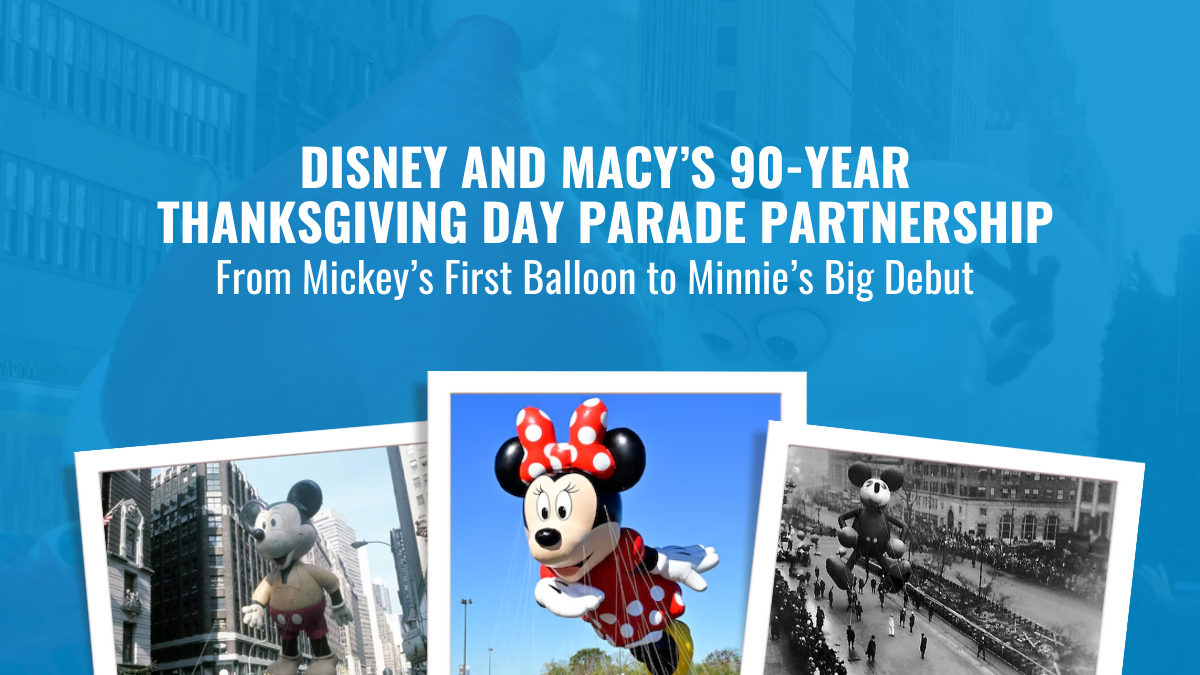
Now, folks, if you’re like me, Thanksgiving just wouldn’t be the same without a coffee, a cozy seat, and Macy’s Thanksgiving Day Parade on the TV. And if you’re really like me, you’re watching for one thing: Disney balloons floating down 34th Street. Ever wondered how Mickey, Donald, and soon Minnie Mouse found their way into this beloved New York tradition? Well, grab your popcorn because we’re diving into nearly 90 years of Disney’s partnership with Macy’s.
The Very First Parade and the Early Days of Balloons
The Macy’s Thanksgiving Day Parade goes way back to 1924, but if you can believe it, balloons weren’t part of the festivities until 1927. That first lineup included Felix the Cat, a dragon, and a toy soldier, all towering above the crowds. Back then, Macy’s had a pretty wild idea to end the parade: they would let the balloons drift off into the sky, free as birds. But this wasn’t just Macy’s feeling generous. Each balloon had a message attached, offering a $100 reward (about $1,800 in today’s dollars) for anyone who returned it to the flagship store on 34th Street.
And here’s where it gets interesting. This tradition carried on for a few years, right up until 1932, when Felix the Cat almost took down a plane flying over New York City! Imagine that—you’re flying into LaGuardia, and suddenly, there’s a 60-foot balloon drifting toward your wing. Needless to say, that was the end of Macy’s “fly away” stunt, and from then on, the balloons have stayed firmly grounded after the parade ends.

1934: Mickey Mouse Floats In, and Disney Joins the Parade
It was 1934 when Mickey Mouse finally made his grand debut in the Macy’s parade. Rumor has it Walt Disney himself collaborated with Macy’s on the design, and by today’s standards, that first Mickey balloon was a bit of a rough cut. This early Mickey had a hotdog-shaped body, and those oversized ears gave him a slightly lopsided look. But no one seemed to mind. Mickey was there, larger than life, floating down the streets of New York, and the crowd loved him.
Mickey wasn’t alone that year. He was joined by Pluto, Horace Horsecollar, and even the Big Bad Wolf and Practical Pig from The Three Little Pigs, making it a full Disney lineup for the first time. Back then, Disney wasn’t yet the entertainment powerhouse we know today, so for Walt, getting these characters in the parade meant making a deal. Macy’s required its star logo to be featured on each Disney balloon—a small concession that set the stage for Disney’s long-standing presence in the parade.
Duck Joins and Towers Over Mickey
A year later, in 1935, Macy’s introduced Donald Duck to the lineup, and here’s where things got interesting. Mickey may have been the first Disney character to float through the parade, but Donald made a huge splash—literally. His balloon was an enormous 60 feet tall and 65 feet long, towering over Mickey’s 40-foot frame. Donald quickly became a fan favorite, appearing in the lineup for several years before being retired.
Fast-forward a few decades, and Donald was back for a special appearance in 1984 to celebrate his 50th birthday. Macy’s dug the balloon out of storage, re-inflated it, and sent Donald down 34th Street once again, bringing a bit of nostalgia to the holiday crowd.
A Somber Parade in 2001
Now, one of my most memorable trips to the parade was in 2001, just weeks after the 9/11 attacks. Nancy and I, along with our friends, headed down to New York, and the mood was something I’ll never forget. We watched the start of the parade from Central Park West, but before that, we went to the Museum of Natural History the night before to see the balloons being inflated. They were covered in massive cargo nets, with sandbags holding them down. It’s surreal to see these enormous balloons anchored down before they’re set free.
That year, security was intense, with police lining the streets, and then-Mayor Rudy Giuliani rode on the Big Apple float to roaring applause. People cheered his name, waving and shouting as he passed. It felt like the entire city had turned out to show their resilience. Even amidst all the heightened security and tension, seeing those balloons—brought a bit of joy back to the city.

Balloon Prep: From New Jersey’s MetLife Stadium to California’s D23 Expo
Each year before the parade, Macy’s holds a rehearsal event known as Balloon Fest at MetLife Stadium in New Jersey. This is where handlers get their first crack at guiding the balloons, practicing with their parade masters, and learning the ropes—literally. It’s an entire production unto itself, with dozens of people rehearsing to make sure these enormous inflatables glide smoothly down the streets of New York on parade day.
In 2015, Macy’s took the balloon show on the road, bringing their Buzz Lightyear balloon out to California for the D23 Expo. I was lucky enough to be there, and watching Buzz get inflated piece by piece in the Anaheim Convention Center parking lot was something to behold. Each section was filled with helium in stages, and when they got around to Buzz’s lower half, well, there were more than a few gas-related jokes from the crowd.
These balloons seem to have a personality all their own, and seeing one like Buzz come to life up close—even outside of New York—had all the excitement and anticipation of the real deal.

Mickey’s Comeback as a Bandleader and Sailor Mickey
After a long hiatus, Mickey Mouse made his return to the Macy’s parade in 2000, this time sporting a new bandleader outfit. Nine years later, in 2009, Sailor Mickey joined the lineup, promoting Disney Cruise Line with a nautical twist. Over the past two decades, Disney has continued to enchant parade-goers with characters like Buzz Lightyear in 2008 and Olaf from Frozen in 2017. These balloons keep Disney’s iconic characters front and center, drawing in both longtime fans and new viewers.
But ever wonder what happens to the balloons after they reach the end of 34th Street? They don’t just disappear. Each balloon is carefully deflated, rolled up like a massive piece of laundry, and packed into storage bins. From there, they’re carted back through the Lincoln Tunnel to Macy’s Parade Studio in New Jersey, where they await their next flight.

Macy’s Disney Celebration at Hollywood Studios
In 1992, Macy’s took the spirit of the parade down to Disney-MGM Studios in Orlando. After that year’s parade, several balloons—including Santa Goofy, Kermit the Frog, and Betty Boop—were transported to Hollywood Studios, re-inflated, and anchored along New York Street as part of a holiday display. Visitors could walk through this “Macy’s New York Christmas” setup and see the balloons up close, right in the middle of the park. While this display only ran for one season, it paved the way for the Osborne Family Spectacle of Dancing Lights, which became a holiday staple at the park for years to come.

Minnie Mouse’s Long-Awaited Debut in 2024
This year, Minnie Mouse will finally join the parade, making her long-overdue debut. Macy’s is rolling out the red carpet for Minnie’s arrival with special pop-up shops across the country, where fans can find exclusive Minnie ears, blown-glass ornaments, T-shirts, and more to celebrate her first appearance in the Thanksgiving Day Parade.

For those lucky enough to catch the parade this year, you’ll see Minnie take her first float down 34th Street, decked out in her iconic red bow and polka-dot dress. Macy’s and Disney are also unveiling a new Disney Cruise Line float honoring all eight ships, including the latest, the Disney Treasure.
As always, I’ll be watching from my favorite chair, coffee in hand, as Minnie makes her grand entrance. The 98th annual Macy’s Thanksgiving Day Parade airs live on NBC, and it’s a tradition you won’t want to miss—whether you’re on 34th Street or tuning in from home.
Theme Parks & Themed Entertainment
Disney’s Forgotten Halloween Event: The Original Little Monsters on Main Street
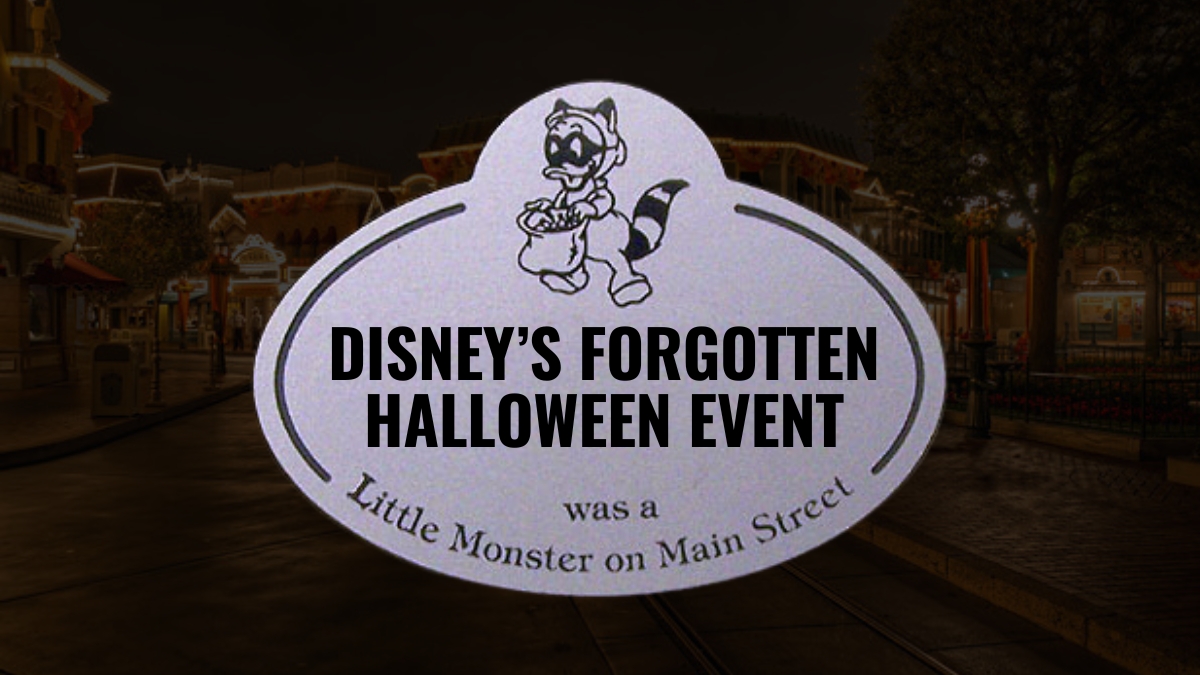
When most Disney fans think of Halloween in the parks, they immediately picture Mickey’s Not-So-Scary Halloween Party at Walt Disney World or the Oogie Boogie Bash at Disneyland Resort. But before those events took over as the must-attend spooky celebrations, there was a little-known event at Disneyland called Little Monsters on Main Street. And its origins? Well, they go all the way back to the 1980s, during a time when America was gripped by fear—the Satanic Panic.
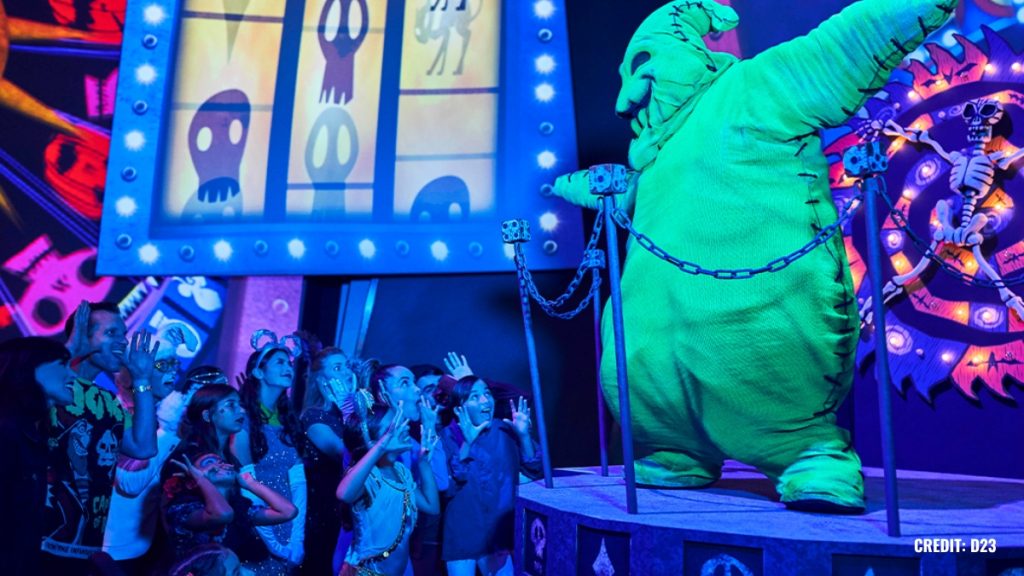
You see, back in the mid-1980s, parents were terrified that Halloween had become dangerous. Urban legends about drug-laced candy or razor blades hidden in apples were widespread, and many parents felt they couldn’t let their kids out of sight for even a moment. Halloween, which was once a carefree evening of trick-or-treating in the neighborhood, had suddenly become a night filled with anxiety.
This is where Disneyland’s Little Monsters on Main Street came in.
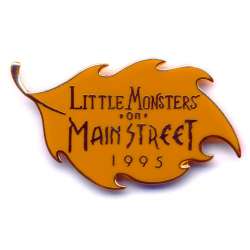
The Origins of Little Monsters on Main Street
Back in 1989, the Disneyland Community Action Team—later known as the VoluntEARS—decided to create a safe, nostalgic Halloween experience for Cast Members and their families. Many schools in the Anaheim area were struggling to provide basic school supplies to students, and the VoluntEARS saw an opportunity to combine a safe Halloween with a charitable cause. Thus, Little Monsters on Main Street was born.
This event was not open to the general public. Only Disneyland Cast Members could purchase tickets, which were initially priced at just $5 each. Cast Members could bring their kids—but only as many as were listed as dependents with HR. And even then, the park put a cap on attendance: the first event was limited to just 1,000 children.
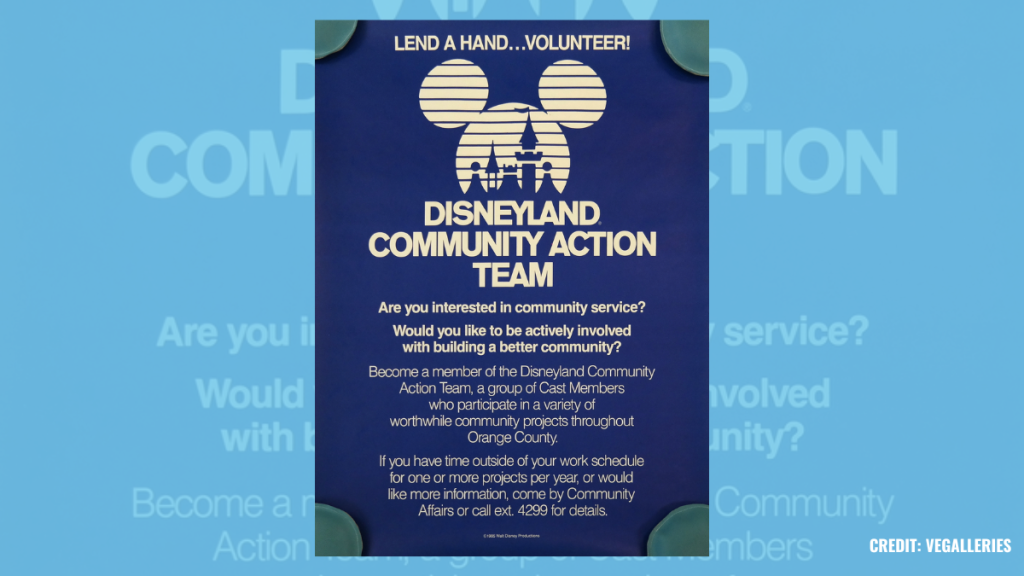
A Unique Halloween Experience
Little Monsters on Main Street wasn’t just another Halloween party. It was designed to give kids a safe, fun environment to enjoy trick-or-treating, much like the good old days. On Halloween night in 1989, kids in costume wandered through Disneyland with their pillowcases, visiting 20 different trick-or-treat stations. They also had the chance to ride a few of their favorite Fantasyland attractions, all after the park had closed to the general public.
The event was run entirely by the VoluntEARS—about 200 of them—who built and set up all the trick-or-treat stations themselves. They arrived at Disneyland before the park closed and, as soon as the last guest exited, they began setting up stations across Main Street, Adventureland, Frontierland, Fantasyland, and Tomorrowland. The event ran from 7:30 to 9:30 p.m., and by the time the last pillowcase-wielding kid left, the VoluntEARS cleaned everything up, making sure the park was ready for the next day’s operations.
It wasn’t just candy and rides, though. The event featured unique entertainment, like a Masquerade Parade down Main Street, U.S.A., where kids could show off their costumes. And get this—Disneyland even rigged up a Cast Member dressed as a witch to fly from the top of the Matterhorn to Frontierland on the same wire that Tinker Bell uses during the fireworks. Talk about a magical Halloween experience!
The Haunted Mansion “Tip-Toe” Tour
Perhaps one of the most memorable parts of Little Monsters on Main Street was the special “tip-toe tour” of the Haunted Mansion. Now, Disneyland’s Haunted Mansion can be a pretty scary attraction for younger kids, so during this event, Disney left the doors to the Stretching Room and Portrait Gallery wide open. This allowed kids to walk through and peek at the Haunted Mansion’s spooky interiors without actually having to board the Doom Buggies. For those brave enough to ride, they could, of course, take the full trip through the Haunted Mansion—or they could take the “chicken exit” and leave, no harm done.
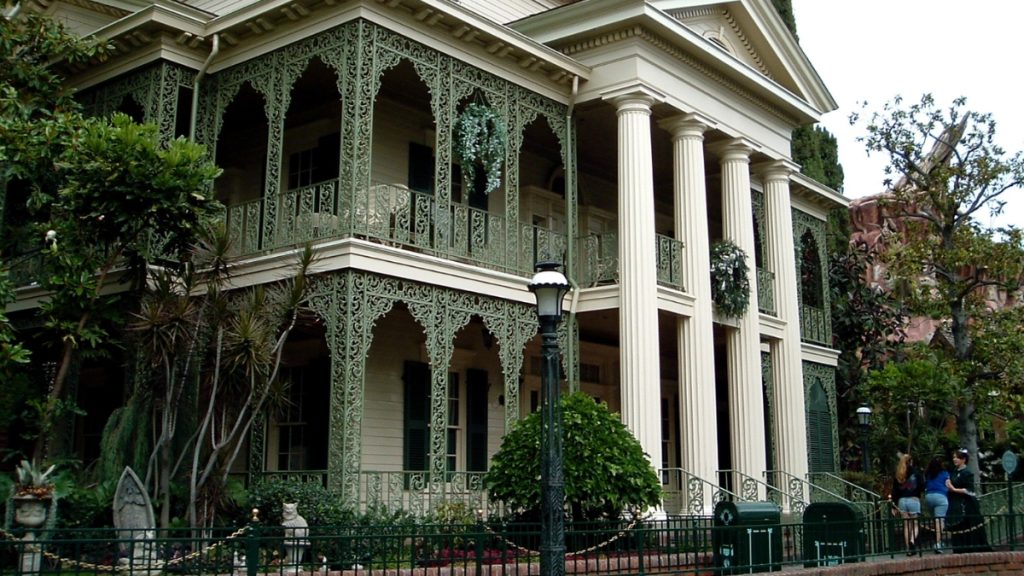
Growing Success and a Bigger Event
Thanks to the event’s early success, Little Monsters on Main Street grew in size. By 1991, the attendance cap had been raised to 2,000 kids, and Disneyland added more activities like magic shows and hayrides. They also extended the event’s hours, allowing kids to enjoy the festivities until 10:30 p.m.
In 2002, the event moved over to Disney California Adventure, where it could accommodate even more kids—up to 5,000 in its later years. The name was also shortened to just Little Monsters, since it was no longer held on Main Street. This safe, family-friendly Halloween event continued for several more years, with the last mention of Little Monsters appearing in the Disneyland employee newsletter in 2008. Though some Cast Members recall the event continuing until 2012, it eventually made way for Disney’s more public-facing Halloween events.
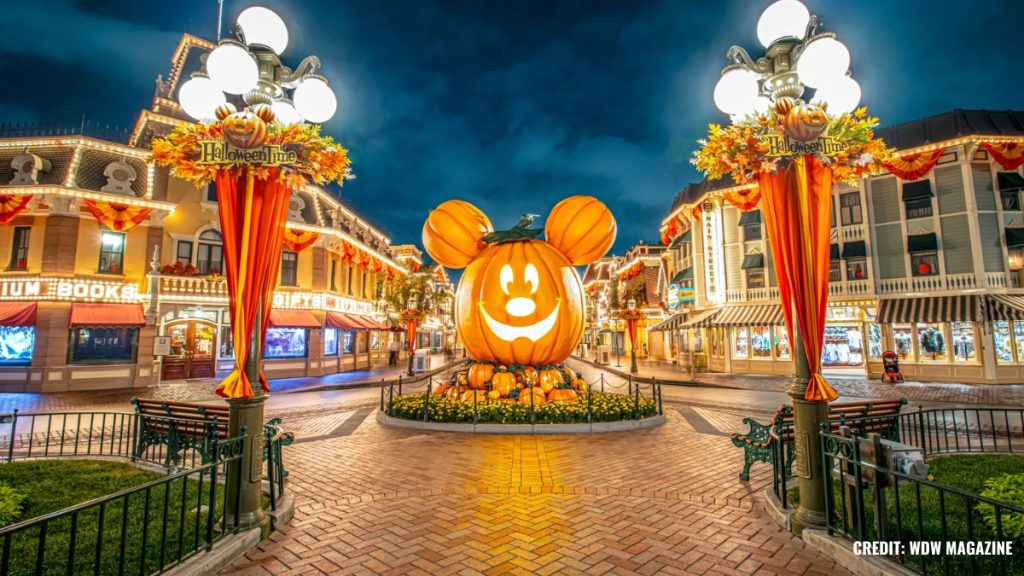
From Little Monsters to Mickey’s Not-So-Scary and Oogie Boogie Bash
Starting in the early 2000s, Disney began realizing the potential of Halloween-themed after-hours events for the general public. These early versions of Mickey’s Halloween Party and Mickey’s Halloween Treat eventually evolved into today’s Mickey’s Not-So-Scary Halloween Party and Oogie Boogie Bash. Unfortunately, this also marked the end of the intimate, Cast Member-exclusive Little Monsters event, but it paved the way for the large-scale Halloween celebrations we know and love today.
While it’s bittersweet to see Little Monsters on Main Street fade into Disney history, its legacy lives on through these modern Halloween parties. And even though Cast Members now receive discounted tickets to Mickey’s Not-So-Scary and Oogie Boogie Bash, the special charm of an event created specifically for Disney’s employees and their families remains something worth remembering.
The Merch: A Piece of Little Monsters History
For Disney collectors, the exclusive merchandise created for Little Monsters on Main Street is still out there. You can find pins, name tags, and themed pillowcases on sites like eBay. One of the coolest collectibles is a 1997 cloisonné pin set featuring Huey, Dewey, and Louie dressed as characters from Hercules. Other sets paid tribute to the Main Street Electrical Parade and Pocahontas, while the pillowcases were uniquely designed for each year of the event.
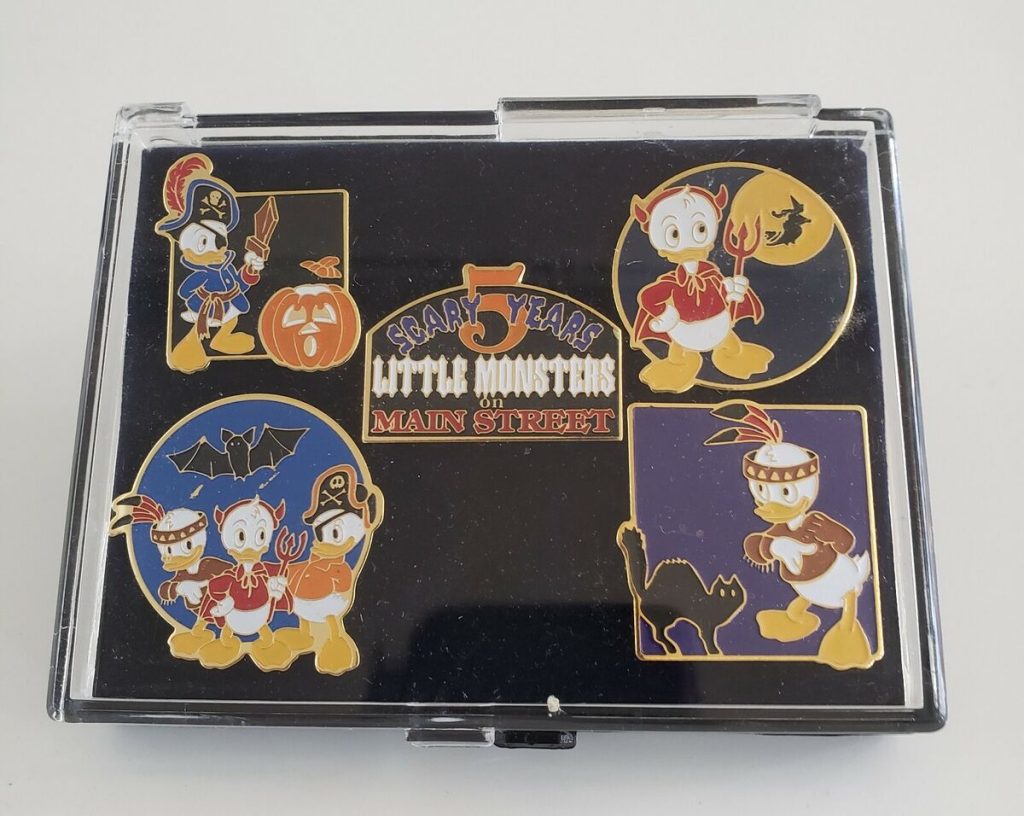
While Little Monsters on Main Street may be gone, it’s a fascinating piece of Disneyland history that played a huge role in shaping the Halloween celebrations we enjoy at Disney parks today.
Want to hear more behind-the-scenes stories like this? Be sure to check out I Want That Too, where Lauren and I dive deep into the history behind Disney’s most beloved attractions, events, and of course, merchandise!
Theme Parks & Themed Entertainment
The Story of Mickey’s Not-So-Scary Halloween Party: From One Night to a Halloween Family Tradition
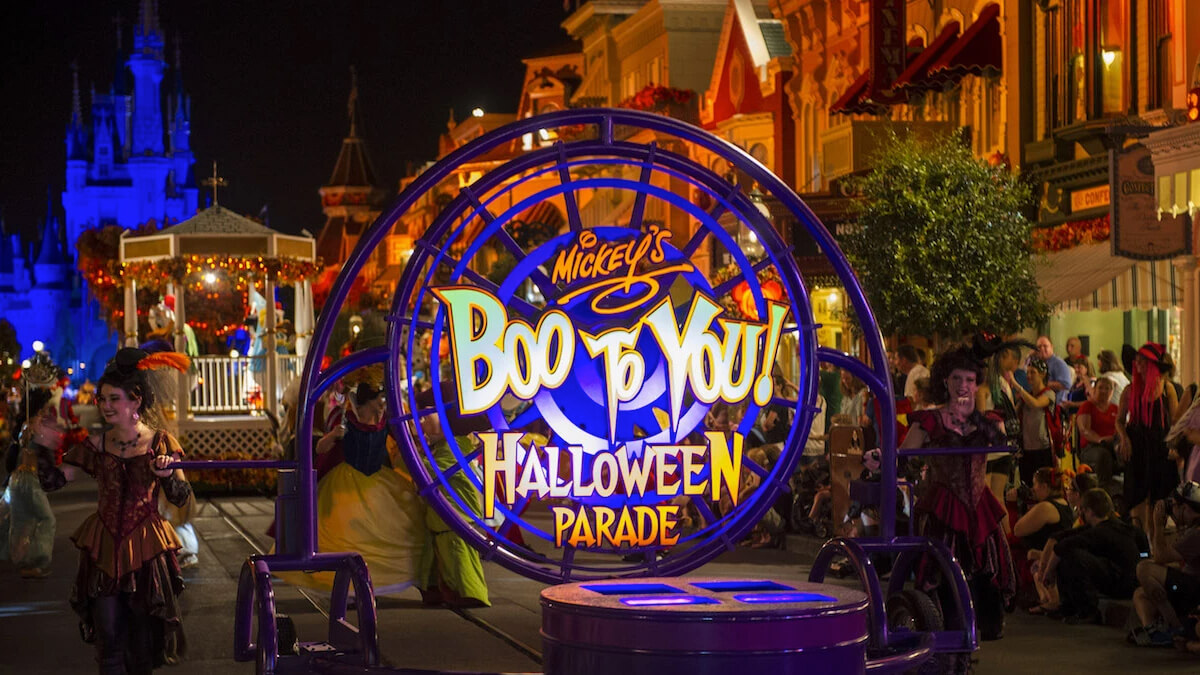
The spooky season is already in full swing at Disney parks on both coasts. On August 9th, the first of 38 Mickey’s Not-So-Scary Halloween Party (MNSSHP) nights for 2024 kicked off at Florida’s Magic Kingdom. Meanwhile, over at Disney California Adventure, the Oogie Boogie Bash began on August 23rd and is completely sold out across its 27 dates this year.
Looking back, it’s incredible to think about how these Halloween-themed events have grown. But for Disney, the idea of charging guests for Halloween fun wasn’t always a given. In fact, when the very first Mickey’s Not-So-Scary Halloween Party debuted on October 31, 1995, it was a modest one-night-only affair. Compare that to the near month-long festivities we see today, and it’s clear that Disney’s approach to Halloween has evolved considerably.
A Not-So-Scary Beginning
I was fortunate enough to attend that very first MNSSHP back in 1995, along with my then 18-month-old daughter Alice and her mom, Michelle. Tickets were a mere $16.95 (I know, can you imagine?), and we pushed Alice around in her sturdy Emmaljunga stroller—Swedish-built and about the size of a small car. Cast Members, charmed by her cuteness, absolutely loaded us up with candy. By the end of the night, we had about 30 pounds of fun-sized candy bars, making that push up to the monorail a bit more challenging.
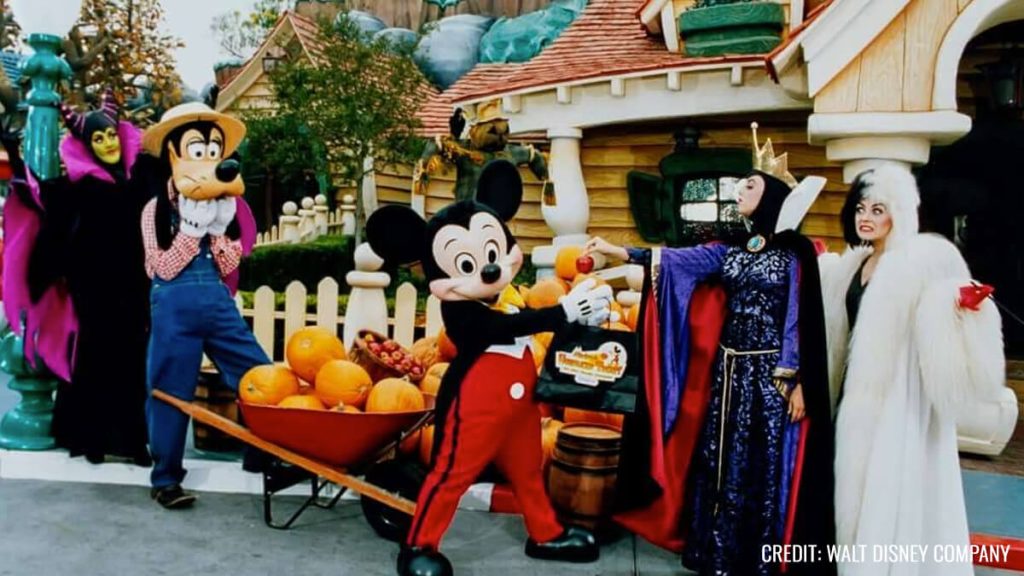
This Halloween event was Disney’s response to the growing popularity of Universal Studios Florida’s own Halloween hard ticket event, which started in 1991 as “Fright Nights” before being rebranded as “Halloween Horror Nights” the following year. Universal’s gamble on a horror-themed experience helped salvage what had been a shaky opening for their park, and by 1993, Halloween Horror Nights was a seven-night event, with ticket prices climbing as high as $35. Universal had stumbled upon a goldmine, and Disney took notice.
A Different Approach
Now, here’s where Disney’s unique strategy comes into play. While Universal embraced the gory, scare-filled world of horror, Disney knew that wasn’t their brand. Instead of competing directly with blood and jump-scares, Disney leaned into what they did best: creating magical, family-friendly experiences.
Thus, Mickey’s Not-So-Scary Halloween Party was born. The focus was on fun and whimsy, not fear. Families could bring their small children without worrying about them being terrified by a chainsaw-wielding maniac around the next corner. This event wasn’t just a Halloween party—it was an extension of the Disney magic that guests had come to expect from the parks.
Disney had some experience with seasonal after-hours events, most notably Mickey’s Very Merry Christmas Party, which had started in 1983. But the Halloween party was different, as the Magic Kingdom wasn’t yet decked out in Halloween decor the way it is today. Disney had to create a spooky (but not too spooky) atmosphere using temporary props, fog machines, and, of course, lots of candy.
A key addition to that first event? The debut of the Headless Horseman, who made his eerie appearance in Liberty Square, riding a massive black Percheron. It wasn’t as elaborate as the Boo-to-You Parade we see today, but it marked the beginning of a beloved Disney Halloween tradition.
A Modest Start but a Big Future
That first MNSSHP in 1995 was seen as a trial run. As Disney World spokesman Greg Albrecht told the Orlando Sentinel, “If it’s successful, we’ll do it again.” And while attendance was sparse that night, there was clearly potential. By 1997, the event expanded to two nights, and by 1999, Mickey’s Not-So-Scary Halloween Party had grown into a multi-night celebration with a full-fledged parade. Today, in 2024, it’s a staple of the fall season at Walt Disney World, offering 38 nights of trick-or-treating, character meet-and-greets, and special entertainment.
Universal’s Influence
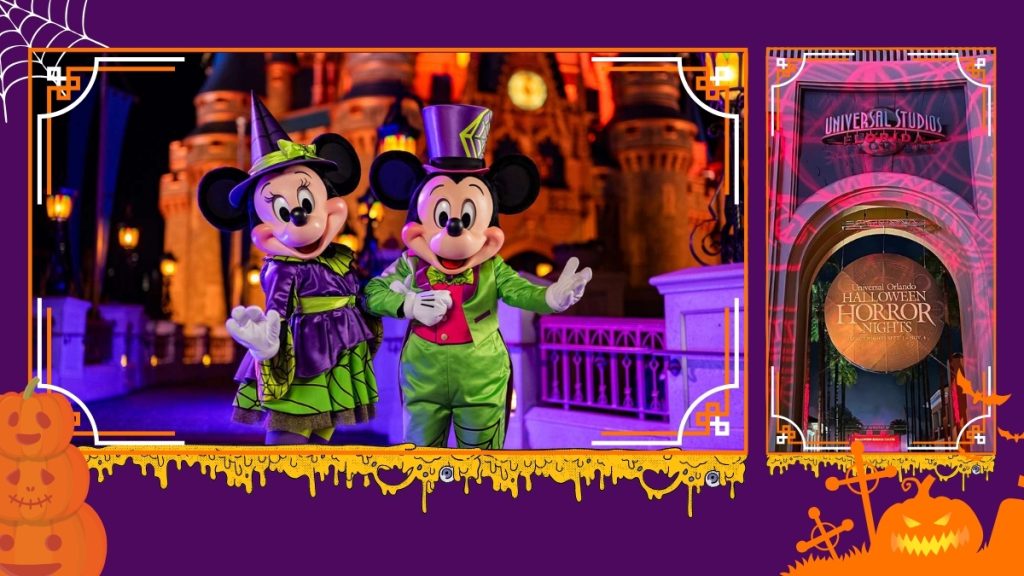
It’s interesting to reflect on how Disney’s Halloween event might never have existed without the competition from Universal. Just as “The Wizarding World of Harry Potter” forced Disney to step up their game with “Star Wars: Galaxy’s Edge,” Universal’s success with Halloween Horror Nights likely spurred Disney into action with MNSSHP. The friendly rivalry between the two parks has continually pushed both to offer more to their guests, and we’re all better off because of it.
So the next time you find yourself trick-or-treating through the Magic Kingdom, watching the Headless Horseman gallop by, or marveling at the seasonal fireworks, take a moment to appreciate how this delightful tradition came to be—all thanks to a little competition and Disney’s commitment to creating not-so-scary magic.
For more Disney history and behind-the-scenes stories, check out the latest episodes of the I Want That Too podcast on the Jim Hill Media network.
-
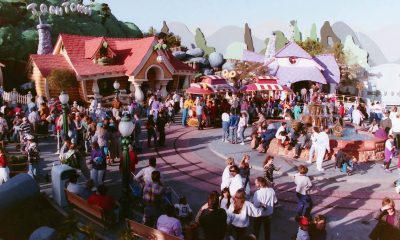
 History10 months ago
History10 months agoThe Evolution and History of Mickey’s ToonTown
-
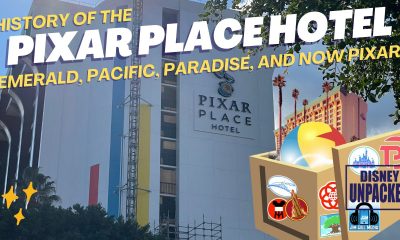
 History11 months ago
History11 months agoUnpacking the History of the Pixar Place Hotel
-
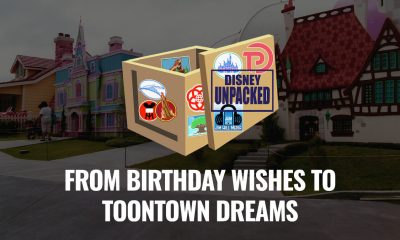
 History11 months ago
History11 months agoFrom Birthday Wishes to Toontown Dreams: How Toontown Came to Be
-
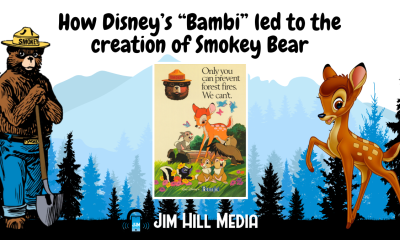
 Film & Movies8 months ago
Film & Movies8 months agoHow Disney’s “Bambi” led to the creation of Smokey Bear
-

 News & Press Releases10 months ago
News & Press Releases10 months agoNew Updates and Exclusive Content from Jim Hill Media: Disney, Universal, and More
-
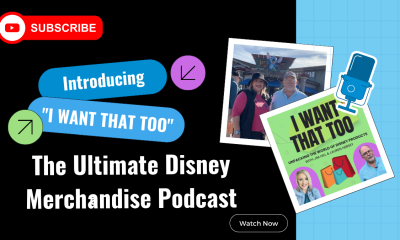
 Merchandise8 months ago
Merchandise8 months agoIntroducing “I Want That Too” – The Ultimate Disney Merchandise Podcast
-
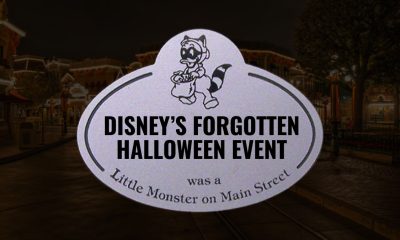
 Theme Parks & Themed Entertainment3 months ago
Theme Parks & Themed Entertainment3 months agoDisney’s Forgotten Halloween Event: The Original Little Monsters on Main Street
-

 Film & Movies3 months ago
Film & Movies3 months agoHow “An American Tail” Led to Disney’s “Hocus Pocus”








